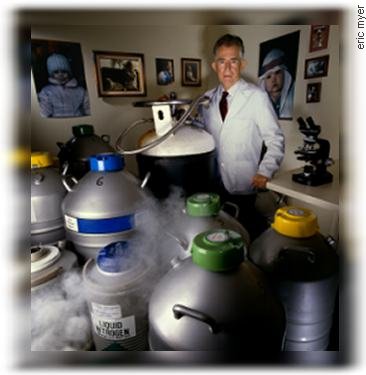 The following excerpts from an article by sociologist W. Bradford Wilcox of the University of Virginia tackles an often ignored topic: “assisted reproduction” for the promotion of single motherhood (i.e., intentionally fatherless families).
The following excerpts from an article by sociologist W. Bradford Wilcox of the University of Virginia tackles an often ignored topic: “assisted reproduction” for the promotion of single motherhood (i.e., intentionally fatherless families). Wilcox raises a number of chilling points. I commend the full article to you, which includes some heart rending stories of the impact of absent fathers on children. Malachi spoke well when he argued against divorce and in favor of families with BOTH mothers and fathers: “Did he not make them one, with a portion of the Spirit in their union? And what was the one God seeking? Godly offspring. So guard yourselves in your spirit, and let none of you be faithless to the wife of your youth” (Mal 2:15, ESV). (12/12/2005, Volume 011, Issue 13; http://www.weeklystandard.com/)
BIRTHS TO UNMARRIED MOTHERS ARE at a record high in the United States--almost 1.5 million in 2004 alone, according to the National Center for Health Statistics. While the rising trend is of long standing, one novel factor driving up childbearing outside marriage is the growing popularity of single motherhood by donor insemination. The incidence of this "assisted reproduction," as it is called, has more than doubled in the last decade.
Most public discussion of donor insemination for single women has been carried on in a neutral, positive, or breathlessly celebratory tone. Isn't it great, the thinking seems to be, that these women are fulfilling their aspiration to be mothers with the latest technology that medical science can offer? Support groups like Single Mothers by Choice and mainstream publications like the Atlantic Monthly, the New York Times, and the Washington Post describe donor insemination for unmarried mothers occasionally as a "sad" necessity for women who cannot find "satisfactory" partners, but more often as "awe"-inspiring, "liberating," or "empowering." Television shows like NBC's drama Inconceivable, broadcast this fall, glamorize assisted reproduction.
This enthusiasm is notable at a time when European countries are skeptical enough to actually ban the process. Sweden and Italy bar single mothers from engaging in either in vitro fertilization or use of anonymous sperm (or, in Italy, eggs), and Britain and the Netherlands have banned the anonymous donation of sperm. Also striking is how adult-centered our public conversation has been.
Until recently, virtually no attention was paid to how the children of donor fathers make sense of their experience. Nor has the public debate acknowledged the moral and social ramifications of deliberately creating a whole class of children without identifiable fathers . . .
Why do fathers matter to children? Fathers typically bring an extra pair of hands, an extra set of kin, and extra income to the child-rearing enterprise, not to mention extra concern for the child's well-being. They also perform better than mothers when it comes to disciplining their children--especially their sons. Finally, fathers who are in good marriages with the mothers of their children implicitly teach girls to expect respect from members of the opposite sex, and boys to treat girls and women with respect.
For all these reasons, it is time to bring children's welfare into the discussion of donor-assisted single motherhood. A serious consideration of children's best interests would probably lead us down a regulatory road comparable to that being pursued in Europe, with bans on the donor-insemination of single women and on the anonymous donation of sperm and eggs. It won't be easy to rein in a multibillion-dollar fertility industry that is used to catering to the desires of adults unhindered by regulation or moral objection. Nor is it possible to protect all children from fatherlessness, given the vicissitudes of life. What should be possible is to reject the deliberate conception of children without flesh-and-blood fathers committed to playing a paternal role in their lives.

No comments:
Post a Comment